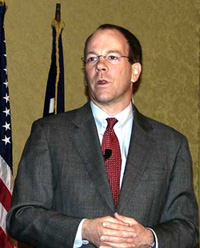|
Week of March 28, 2005 Special Report |
|
LOOKING FOR A PREVIOUS STORY? CHECK THE ARCHIVE.
Site Selection Bonus Coverage of 'Technological Transformation' Keeps an by MARK AREND, Site Selection Editor
Economist Brian Wesbury launched IAMC's Professional Forum programming on a decidedly optimistic note. Among other observations made in his Opening General Session, Wesbury noted that the cost of oil per barrel could jump to US$80 from its current mid-$50s-per-barrel rate, and the economy would withstand the impact. However, Wesbury did name energy costs as one of two areas he considers worrisome in the long term; the other is the growing budget deficit.
Across the board, from GDP to business expansion activity to manufacturing exports, economic indicators point to strong, steady growth in 2005 with a roughly 4.5 percent GDP growth rate likely through 2006. Inflation will rise somewhat as a result of Federal Reserve policy that lowered interest rates to record lows in recent years, but the Fed has already begun raising interest rates to blunt any significant inflationary comeback. Still, many feel disconnected to the overall economic prosperity that has emerged from the recession following 9/11. People in that category are likely out of touch to some degree with the technological transformation behind the economic growth now under way, Wesbury posited. Industries are reconfiguring themselves to compete more effectively with more technologically advanced players, and not everyone in those transforming industries will make the cut. The airline industry is a good example, where start-up, low-cost carriers are forcing legacy carriers to change the way they do business, and airlines in general now compete with non-airlines, such as business jet part ownership providers, for the business traveler's dollar. Wesbury was particularly sanguine on the topic of China as a global economic force, noting, "China has peaked - its competitive advantage is declining." In fact, a market for corporate real estate directors to watch is the United States, which Wesbury says is enjoying a "manufacturing renaissance" due to the fact that labor costs are low enough in many areas to compete with offshore locations. And speaking of the U.S., look for more of what Wesbury calls the "de-urbanization of America," where those in the entrepreneur community are choosing locations outside the major cities of the two coasts. More and more new businesses are shunning the so-called conveniences of urban centers in favor of areas strong on quality-of-life factors, generally in small cities and towns with a university from which to recruit employees. Increasingly, said Wesbury, "Location doesn't matter as much to these particular players."
©2004 Conway Data, Inc. All rights reserved. Data is from many sources and is not warranted to be accurate or current.
|
